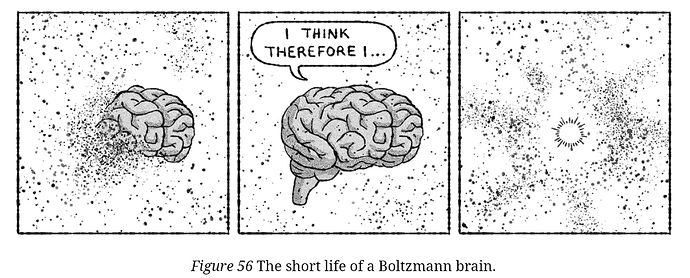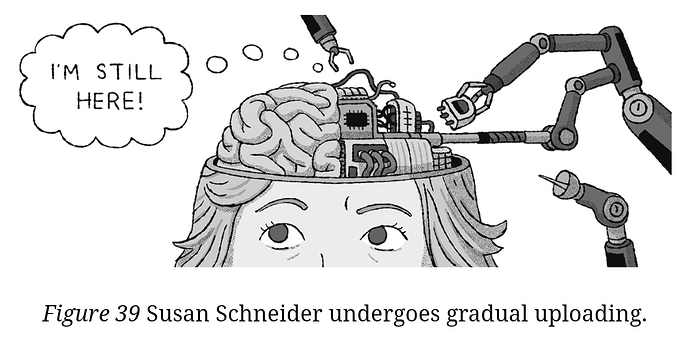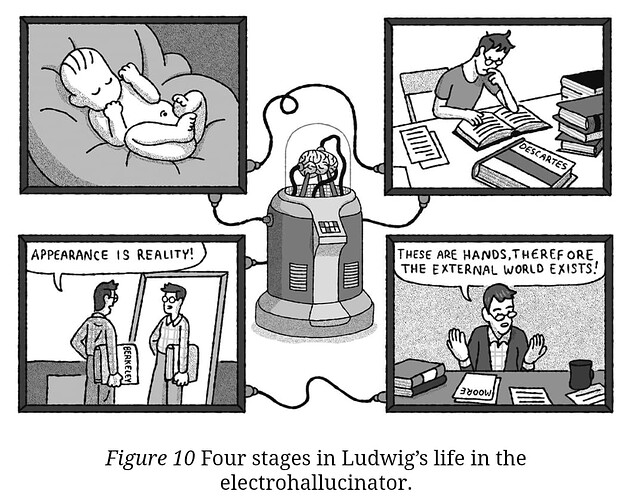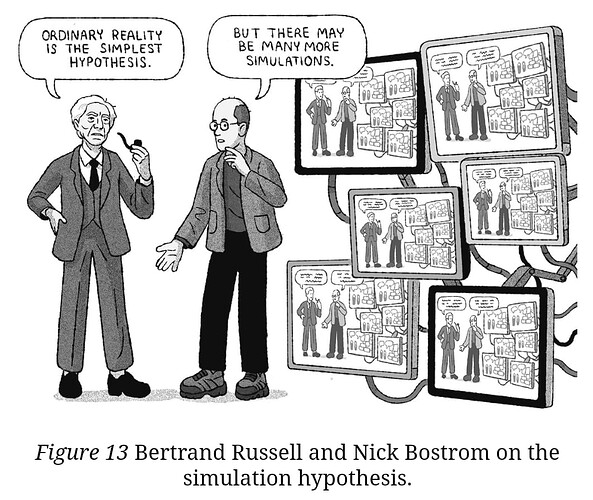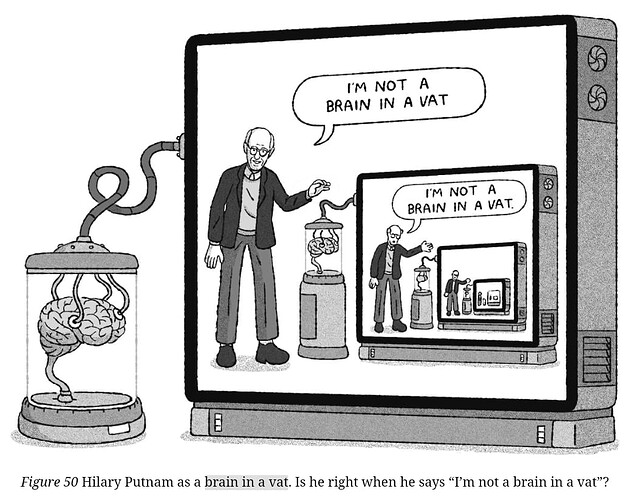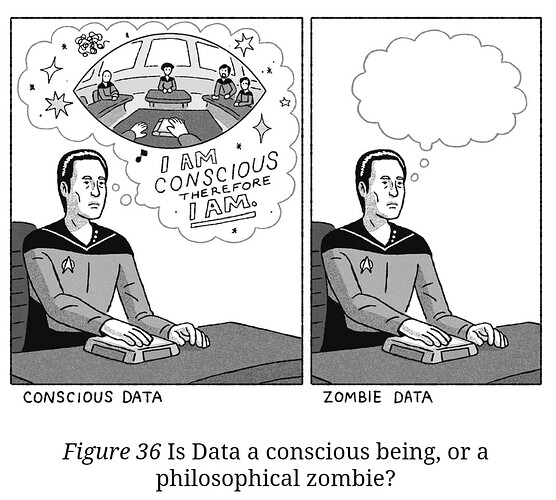No wait a second. I didn’t think that one through very much. Scratch that.
Chalmers book, as the title suggests, expands on the question.
Your suggestions are interesting, but also very technological in origin. As a child I used to wonder about alternatives for more efficient transportation, with your suggestions being the ultimate achievement. But what does it mean to have achieved that, in a Simulation at a trillion times the speed of regular life? So humans can move anywhere, in the scope of ‘a simulation’, and have their meaningful life everywhere, a trillion times faster than in regular life today. What would be its purpose?
The idea of self preservation, thus to prevent Earth life to become abolished by a billion rotations around the Sun, or what the Milky Way may have in spe in the future, could provide a motive for humanity to seek an escape in a Simulation. It would be similar to humanity’s dream to fly off into space - to escape planet Earth - to start a colony on other planets.
At question is however, does it actually serve the purpose of life?
Right. If the ones with the resources to make it happen aren’t doing self=other & just want to be able to predict/control, it’s not a good social contract to voluntarily (or otherwise) enter.
If this reality is a simulation, it has way too much actual freedom to pass as one. Which means those not doing self=other … well. They’re not in control. For long.
Also… see my previous replies.
There are many philosophers who believe that free will does not exist, and the free will debate is an unsettled debate. Chalmers recently won a 25 year bet from a neuroscientist for just that reason:
Neuroscientist Loses 25-Year Bet With Philosopher About Consciousness
Can you please substantiate your idea ‘actual freedom’ and why it would disprove Simulation Hypothesis?
Can it be otherwise? My assertion is based on the idea that the fundamental requirement of “Complete Knowledge” implies a context of technocratic Totality that is necessarily applied with a purpose of a specific type and scope that has various implications.
Why would a creator create a Simulation? The requirement of complete knowledge implies that Simulation requires a fundamental answer to that question.
Chalmers wrote the following in his book:
Is God a hacker in the next universe up?
If we create simulated worlds ourselves, we’ll be the gods of those worlds. We’ll be the creators of those worlds. We’ll be all-powerful and all-knowing with respect to those worlds. As the simulated worlds we create grow more complex and come to include simulated beings who may be conscious in their own right, being the god of a simulated world will be an awesome responsibility.
If the simulation hypothesis is true and we’re in a simulated world, then the creator of the simulation is our god. The simulator may well be all-knowing and all-powerful. What happens in our world depends on what the simulator wants. We may respect and fear the simulator. At the same time, our simulator may not resemble a traditional god. Perhaps our creator is a mad scientist, like Rick – or perhaps it’s a child, like my nephew.
The transhumanist philosopher David Pearce has observed that the simulation argument is the most interesting argument for the existence of God in a long time. He may be right.
I’ve considered myself an atheist for as long as I can remember. My family wasn’t religious, and religious rituals always seemed a bit quaint to me. I didn’t see much evidence for the existence of a god. God seemed supernatural, whereas I was drawn to the natural world of science. Still, the simulation hypothesis has made me take the existence of a god more seriously than I ever had before.
Why would the Simulation be created? That question would need to have a fundamental answer beforehand, due to the requirement of complete knowledge and the situation of a technocratic Totality in which that requirement results.
The ‘inside-out’ purpose from the perspective of the technocratic Totality, results in a ‘top-down’ situation for purpose in the Simulation.
From the perspective of the Simulation (‘reality’), the world would be Given, an idea that various of my own theories would fundamentally oppose, and that, in my opinion, has adverse effects for morality.
I’ll read that in more detail later especially if somebody/something reminds me, I’ll set a reminder, but when you go from actual to analog to digital with music … you don’t get to mess with it when you reverse the process.
So basically free form jazz defeats the simulation hypothesis.
I am very interested to learn your philosophical substantiation (theory).
Perhaps it would help when you would imagine that you would need to convince David Chalmers who just released a 1000 pages book to make a case for the ideas behind the Brain In A Vat. What would be his response to your argument that free form jazz defeats the simulation hypothesis?
Would you have expected Chalmers to have had this view since the beginning of his career?
I haven’t read the post I said I was going to read but what you’re talking about right now has something to do with identity. Sounds like reverse engineering to me, or having twins. I don’t see what the big deal is. See my last replies. However, I still haven’t read that one reply, and I am about to do that.
Also, since I haven’t read his book, I can’t possibly know how he would respond. Are you expecting me to make his argument for him? But anyway I am going to read your reply.
You have to be what it is in order to have complete knowledge of this sort. I wouldn’t worry too much about it.
yeah. Simulation’s WHY. Nobody makes or participates in a movie without having something to say that they think will resonate with at least one other person or at least needs to be heard even if they’re the only one that gets it right now. Nobody makes an interactive game they don’t intend (for people) to enjoy by playing it. It all pivots self=other, unless they’re just trying to make money. Or some other really stupid reason.
You seem to be selling the simulation idea as a way of escaping earth before it is destroyed. It doesn’t work that way. It just means you’re going to be oblivious when the Earth is destroyed. Do not go gently. Plus that is like so many … could be happening right now, for all we know. Hah! Made you flinch! Just do self=other, man. Pretend that you’ll level up like that dude in Groundhog’s Day and that you can respawn.
They need to redo that movie with the end of the world happening just before consummation, instead of the new morning happening thereafter.
Sorry. A certain chess player has me in a snarky mood.
Yes. My argument is that it could be consider-able, that a ‘supposed’ purpose of life is to increase complexity and therewith ‘meaning’ in time. (to enhance the qualitative content of Henri Bergson’s ‘duration’ as it were, or more commonly said 'to maximize (human-life’s) potential).
While from the outlook the problem of earths ultimate destruction might not directly be solved, if increasing meaning in time would be the actual purpose of life and when Simulation Hypothesis would be used to serve that interest, it would logically result in a Singularity and thus an actual escape of earths destruction.
Chalmers addresses the idea of Simulation within Simulation in his book.
A Singularity of ‘increasing meaning in time’ facilitated by Simulation could be a case for the idea that reality as it is experienced (your free form jazz) is an actual Simulation.
What else would be life’s purpose? Its purpose is not giving in to death and suffering, but surely maximizing potential, in my opinion.
I have some clues that maximizing potential might actually be touching on the edge of the actual purpose of life, which would provide a basis for the idea that the theory could potentially be plausible. What is seen, is that helping others to maximize their potential provides people with a feeling of fullfilment of the highest purpose possible. The other is a significant factor in this, and that reveals something important in the case of maximizing potential.
But again, I am a real critic of the Brain In A Vat idea and Simulation Hypothesis, based on fundamental theory in the scope of morality. I do not actually believe that the idea of ‘increasing meaning’ is to be achieved within the context of pure technocracy (a Totality with a top-down Given purpose).
Good luck with that.
The purpose is not given, but “a given”. It has always existed. The meaning we create is either in alignment with it or it is nihil for the fire. It is something that we create toward, which requires choice. self=other is the technic of the Why. Being-in-Relation. Not “being alone” (Parmenides… unless he MEANT Being-in-Relation).
Why would it be impossible?
I have seen no substantiation yet for the following argument:
Why can that ‘free’ aspect not be a Simulation?
I would disagree that such a perspective would be valid, when what you say is ‘given’ (when you give it to others through philosophical conveyance).
What else is a philosopher to do, than to convey to others? Without others, he or she would mumble in empty space and wonder whether a ![]() tree falls when there is noone around to hear it. However, a saying is “the wise is Silent”, and that would imply a situation without others, at least from a ‘speech’ or ‘speaking out’ perspective, and from the perspective of a sort of ultimate state of the philosopher.
tree falls when there is noone around to hear it. However, a saying is “the wise is Silent”, and that would imply a situation without others, at least from a ‘speech’ or ‘speaking out’ perspective, and from the perspective of a sort of ultimate state of the philosopher.
Alignment with what is ‘ought’ might not be found in the idea of alignment, but with the potential of the idea of alignment in the first place, which would result in the idea of “Good”, through which one finds a responsibility that by itself shows that purpose cannot be fixated, or ‘Given’.
The fundamental Why that I mentioned in some other posts, the Why of Why being philosophical evidence of the nature of reality, would not imply that one can align with a certain path, as if the world is determined by a plan, but rather that one can fundamentally serve the path of life without that being either based on indeterminate ground, or actual ground. The idea of Good made plausible through philosophy, would ‘lead the way’ so to speak.
I wrote the following in another topic:
Why ask why… Why existence?
Philosophy can make a case for evident applicability of the Why question, and as such legitimize their business. The validity of a chosen philosophical path can be questioned, and with a Why question fundamental to a philosophical endeavour, that ‘ought’ to be, and is where one finds the foundation of true morality. The philosophical Why results in Aristotle’s eudaimonia, which is a state of ‘philosophical contemplation’ with as a result ‘the highest human virtue’, namely, alignment with the moral good.
My suggestion was intended to suggest the consideration of the most profound defence of the Brain In A Vat concept possible (a book of 1000 pages).
How can your notion of ‘free’ be defended? Not by itself, but in light of philosophers who would intend to make a case for the Brain In A Vat concept or Simulation Hypothesis?
An example argument from the book:
"A neuroscientist, Dr. Smythson, devises an “endocephalic electrohallucinator”—a sort of simulator—which can produce hallucinations of all sorts of different worlds. The scientist takes a newborn’s brain and places it in the electrohallucinator. He christens the baby “Alfred Ludwig Gilbert Robinson,” or Ludwig for short, after the Austrian philosopher Ludwig Wittgenstein.
Dr. Smythson resolves to give Ludwig the experiences of a coherent and happy life. Ludwig receives an excellent education, with particular exposure to works of philosophy. He’s particularly taken by the works of René Descartes, which provoke him to worry that he might be hallucinating the world with sensations produced by an evil demon.
Fortunately, Ludwig encounters the work of a succession of philosophers who set out to prove that skepticism is false. He reads the works of George Berkeley, who convinces him that appearance is reality, so that the external world that he perceives is real."
Another quote from the book Reality+, which is truly a great book for people who ![]() love philosophy
love philosophy ![]() And I am saying this as a fundamental opponent of Simulation Hypothesis.
And I am saying this as a fundamental opponent of Simulation Hypothesis.
"The central thesis of this book is: Virtual reality is genuine reality. Or at least, virtual realities are genuine realities. Virtual worlds need not be second-class realities. They can be first-class realities.
This book is a project in what I call technophilosophy.
It’s worth saying that my views about consciousness and the mind are not the main focus of this book. I’ve explored those issues in other work, and this book is independent of them to a large degree. I hope that even people who disagree with me about consciousness may find my picture of reality appealing. … a fourth plank to the thesis that virtual reality is genuine reality: namely, virtual and augmented minds are genuine minds.
… this book is as full of my own philosophical theses and arguments as anything I’ve ever written. While some chapters of the book go over ground I’ve discussed in academic articles, well over half of it is entirely new. So even if you’re an old hand at philosophy, I hope that you’ll find rewards here. In an online supplement (Reality+ – David Chalmers), I’ve included extensive notes and appendices pursuing the issues in more depth, often including connections to the academic literature."
The book contains a lot of illustrations that show the perspective of prominent philosophers in relation to the Brain In A Vat / Simulation Hypothesis idea.
The book provides an allround update on what philosophy is, where it came from, how it solves questions and problems and … “a complete philosophical case for the ![]() Brain In A Vat idea” with all the latest insights about philosophy related to VR, AR and Simulation.
Brain In A Vat idea” with all the latest insights about philosophy related to VR, AR and Simulation.
It is a book that might inspire young people to develop an interest in philosophy, when they never heard about philosophy before. A great book to provide as a ![]() gift to students to interest them for philosophy.
gift to students to interest them for philosophy.
The philosophical ‘high value’ take from the book even if Simulation Hypothesis is wrong? The mere ability to make a case for the Brain In A Vat idea.
When leaving the book, you may need to rethink what it takes to deny the claim that you are actually living in a Simulation and that gut feeling alone isn’t going to cut it. You’re left with … philosophy.
To falsify the claims related to the Brain In A Vat / Simulation Hypothesis, it ultimate comes down to resolving the Philosophical ![]() Zombie problem, invented by David Chalmers in 1996 as an argument against physicalism.
Zombie problem, invented by David Chalmers in 1996 as an argument against physicalism.
https://plato.stanford.edu/entries/zombies/
What is interesting is that David Chalmers recently won a 25 year bet from neuroscientist Christof Koch, which dates from around the time that he invented the Zombie Argument.
A 25-Year-Old Bet about Consciousness Has Finally Been Settled
What do you think? Is Simulation Hypothesis valid and is data to be considered conscious?
neg: That/those which/whom does/do not exist does/do not have power.
pos: That/those which/whom exist(s) has/have power.
neg: We are not free to do what is not within our power.
pos: We are free to do (or not do) what is within our power.
neg: That which is not free is not able to direct its power, but is instead compelled by it.
pos: That which is free is able to direct its power rather than being compelled by it.
**
One way for a being to show it is free is to delay response time to strong impulses or strengthen/speed up responses to weak impulses. Another way for a being to show it is free is to go against its own genetic and social programming. One/another way for a being to show it is free is to go against the flow of the crowd that is violating self=other (a short-circuiting crowd, that… not a free one).
We could not make/draw such distinctions if we weren’t free to varying degrees.
Why are you disregarding what I said about Freeform Jazz? Anyway, I hope my above comment serves as an acceptable supplement.
We are hardwired to be able to say no to our programming/impulses. And we are hardwired to go beyond them. We are not just machines that mimic the flow or come up with all the logical possibilities. We can ask why we care. We can ask why we don’t care. We can ask or wonder why we can do some things and not other things. We can ask if some things are better to do than other things. We can ask if other people or like us or are different from us and how and why. It all starts with the programming that makes us feel certain ways in response to certain inputs. The next step is to look at the input and response and ask questions about it. To not just accept it as given is to say no until it is understood/interpreted in a way that does not cause contradiction or cognitive dissonance.
That basic structure is required in order to base/anchor/ground a choice. A demonstration. An existing of essence. A revelation.
Firstly, I want to make it clear that I am on your side when it concerns a defence of concepts such as ‘free’.
This was recently scientifically proved. In general, doctors have increasingly become open to ideas such as the influence of positive thinking and happiness on the capacity to heal.
“In an interesting twist to the enduring nature vs. nurture debate, a new study from Stanford University finds that just thinking you’re prone to a given outcome may trump both nature and nurture. In fact, simply believing a physical reality about yourself can actually nudge the body in that direction—sometimes even more than actually being prone to the reality.”
https://www.nature.com/articles/s41562-018-0483-4
Your argument is based on dialectical logic, but how can it be said that any of such logic is to be considered valid when it concerns fundamental questions?
Critics may be easy to point out that it can be an illusion, on the same terms that you are using to make case for ‘free’. The mere ‘ability’ to do so is sufficient to function as a philosophical motive for them.
Take for example Daniel Dennett’s claim that consciousness is an illusion. Why is he wrong? Does your logic prove him wrong?
You cited vitalism in another topic, but that concept would propose that life involves different ‘laws’ but still “laws”.
- Vitalism is the belief that living organisms possess a non-physical or non-material element, force, or principle (“vital spark”, “élan vital”) that distinguishes them from non-living entities and governs their processes in a way that cannot be fully explained by physical and chemical laws alone. Vitalism does propose that life involves different laws or principles than non-living matter, but it still posits the existence of laws governing living organisms, not a complete absence of order or natural laws.
Why isn’t it possible that the experience of having power is an illusion produced in a brain, and replicable in a Brain In A Vat (Bio Simulation), and that life is fundamentally governed by laws?
What you said:
Why would Chalmers be obligated to say: “You are correct, I was wrong”? Can you please explain how your argument would disprove Simulation Hypothesis as set out by for example David Chalmers?
Personally, I would argue for concepts like intentionality (Husserl) and attention.
When it is established, as per my initial post in this topic (in reply to the topic author), that consciousness ‘becomes’ through data from the senses. And that in order to explain the senses, one is to explain perception itself, the concepts intentionality and attention would enable to make progress for an argument to disprove the ![]() Brain In A Vat idea and Simulation Hypothesis, in my opinion.
Brain In A Vat idea and Simulation Hypothesis, in my opinion.
Intentionality and attention are required in order to “mess with it” with respect to my freeform jazz comment.
I believe folks like … I think it was Aristotle … call life ensouled… that is the heart of the tin man referred to in the Henri Bergson thread.
How are you going to defeat the legitimacy of dialectic logic without freely using it? Good luck with that.
